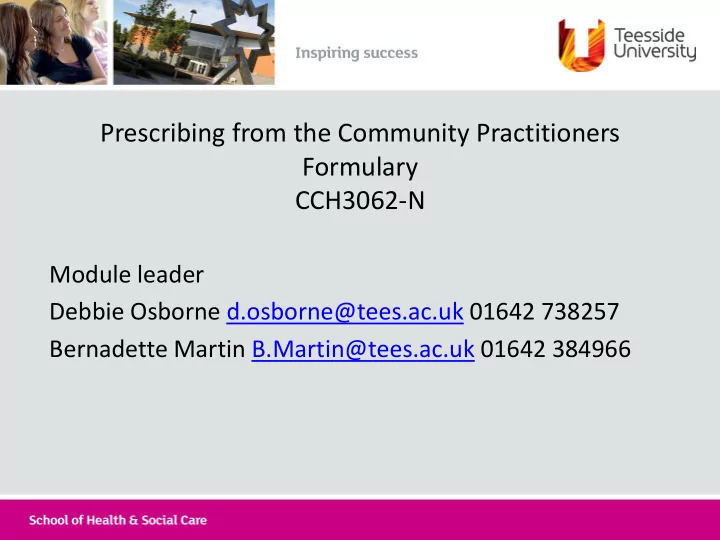

Prescribing from the Community Practitioners Formulary CCH3062-N Module leader Debbie Osborne d.osborne@tees.ac.uk 01642 738257 Bernadette Martin B.Martin@tees.ac.uk 01642 384966
Firstly ….. Thank you for agreeing to mentor your student Mentor website Practice Support V150 Prescribing
Aim of the module is to……. To develop and enable Staff Nurses without a Specialist Community Nursing Qualification to prescribe safely & effectively as independent prescribers from the Community Practitioners Formulary
Learning Outcomes Understand the history of nurse prescribing Consider what the implications of prescribing mean for you Ethical, legal & accountability issues Investigate the strategies which will inform safe and effective prescribing practice Using the NPF/BNF Writing prescriptions Pharmacology/pharmacokinetics History taking Drug Calculations
Assessment Strategy A practice portfolio includes: • Reflective critical analysis 2000 words • P formulary worksheet x 1 • Learning logs • Case studies x 4 • A written final examination • PRACTICE - Satisfactory completion of the period of practice experience – documented and evidenced. You are assessing them to prescribe within their own clinical competence and area of practice – not outside of this.
NEW! 360° interpersonal skills tool – pilot 2016/17 Developed with Service user/carer group One assessment this year Evaluate for full addition next year Service user/mentor/student
NMC Any nurse undertaking a V100 prescribing programme as part of a Specialist Practitioner qualification should be known as a community practitioner nurse prescriber (V100) and any nurse undertaking a new programme to be known as a V150 would also be known as a community practitioner nurse prescribers and will only be entitled to prescribe from the Community Practitioner Formulary The programme of preparation (education and training) for registered nurses to prescribe from the community practitioner formulary equips nurses with the principles of prescribing to enable them to be safe, effective and cost-effective prescribers. When an employer considers the suitability of a registrant to develop skills in prescribing, it is their responsibility to ensure that the registrant is able to apply the prescribing principles to their own area of practice. Nursing and Midwifery Council (2009) Standards of proficiency for nurse prescribers without a Specialist Practice Qualification to prescribe from the Community Practitioner Formulary. http://www.nmc-uk.org/aDisplayDocument.aspx?documentID=3567
Practice Mentor role.. • Be a practising community practitioner nurse prescriber who has agreed to provide supervision for the duration of the programme. • Have some experience or training in teaching and \ or supervising in practice. • Responsible for facilitating and supporting learning in practice and assessing the competence of the student to prescribe safely and effectively.
Examples of supervision • Dedicated time and opportunities for the nurse to observe how you conduct a "consultation/interview" with patients and/or their carers, and the development of a subsequent management plan. • Opportunities to allow in-depth discussion and analysis of clinical management using a random case analysis approach, when patient care and prescribing behaviour can be examined further. • Facilitate student learning by encouraging critical thinking and reflection with the use of the student’s practice portfolio or learning log. • Allow opportunities for the student to carry out consultations and suggest clinical management and prescribing options, which are then discussed by both you and the student.
Practice • Supervised learning in practice will comprise a total of 10 days (x 7.5 hours) of the students’ time. You should be willing and able to devote a sufficient part of your time during this period of supervision to provide appropriate guidance for the student. • Learning in practice will be related to the conditions and circumstances in which the prescriber from the community practitioner formulary is likely to prescribe. • The supervising practitioner may be a nurse with whom the student normally works. However, arrangements can be agreed where another nurse who prescribes from the community practitioners formulary acts as supervisor, provided the criteria above are met. • A non-medical prescriber can act as a mentor however they must also hold the prescribing from the community practitioner formulary qualification.
Recommend
More recommend